- Home
- Natalie Grey
The Dragon Corps Page 4
The Dragon Corps Read online
Page 4
The smile didn’t last long. It was satisfying to see Jacinta Nikolau’s body lying twisted and broken on the ground. She had been a thorn in his side for months now, first a cipher with no name, and then, even once he identified her, a surprisingly difficult woman to find.
She walks into my mines every day. She goes through my checkpoints. Why the hell can’t you find her?
We will.
And they had, but now there would be another to take her place. There was always another.
Every time the resistance flared, he put them down. When they were especially intractable, he called in help—as he had this time.
It was something he had once sworn he would never do. It was a risk, every time. Having reports doctored, sending in soldiers who might, at any point, figure out the truth. Every time he did it, he laid a trail.
Part of him knew it was only luck that they hadn’t picked up on it yet. His heart had stopped for a moment when he watched the video and saw the leader of the Dragon team stop to speak with her. Dragons weren’t supposed to speak, they were supposed to kill. They were a weapon who liked to dress their purpose up in fancy morals, but a weapon had one purpose: death.
This particular Dragon commander … could be a problem. The Warlord rewound the video and stared at the still shot of the man hunched, staring down the barrel of his weapon as he called out to the resistance leader.
The man’s determination to take him down was well-known in certain circles. The Warlord took a perverse pleasure in it every time Team 9 came to do his bidding on Ymir. If they only knew….
He swallowed convulsively. If they only knew.
There would be no hiding once they found out they had been deceived.
After a moment, the Warlord’s shoulders relaxed fractionally and he forced a smile onto his lips. They were already trying to kill him. They had been trying for forty years. He had held them off: the Navy, Intelligence, the resistance … the Dragons. Everyone was always trying to kill him.
But so far, he had won every time. He had put measures in place to make sure he would win every time.
Let them come. He would see them dead in the dirt like Jacinta. He would kill every resistance leader that popped up, until there was no one willing to step forward and take their place.
He ignored the small voice in his head that suggested that day might never come.
It should have been her lying there in the street. Samara knew that.
They hadn’t buried Jacinta. It was what she would have wanted. Her body lay in the street for everyone to see. The Warlord taunted them like this every time he had the Dragons sent in to put the resistance down. He left the signs of his victory strewn in the streets: buildings not repaired, cobblestones out of place.
Bodies lying in pools of their own blood.
It was a cruel gesture, but also a test. Every camera on those streets was turned toward the bodies. If anyone were to try to pay their respects, or take it for burial, there would be soldiers on them in seconds. They would be named as a resistance fighter and executed as one.
So they left Jacinta’s body where it was, and comforted each other in the dark of night when their shifts in the mines were over. They prayed for her silently, because words were dangerous.
Samara clenched her nails into her palms each night and willed herself not to cry while her throat ached and her whole body tensed. Jacinta had sent her away, into the darkness. The Dragons came for the leaders, and Jacinta had sacrificed herself accordingly—Zela, too.
Or perhaps Zela had made the choice herself. No one knew. Neither of them were around to ask anymore.
“What do we do now?” Arlon asked dully, two days after the massacre. When he followed Jacinta, he had been brash, sometimes overconfident, and almost always smiling. Now he looked twice his age, and wholly defeated.
“We keep going,” Samara said.
They all looked at her, and she felt the prickling sensation of the ground disappearing under her feet. She had never had so many people looking at her before. When she spoke up in meetings, she was aware only of Jacinta’s steady regard. She spoke up with any idea she had, then, because she knew Jacinta would listen to everything and pick only the best. It was safe to suggest the wrong thing. Jacinta would keep them safe.
Only now Jacinta wasn’t here, and everyone was looking at Samara like she knew what to do, and she knew the truth was very different: she should be the one lying in the street, and Jacinta should still be here.
“Jacinta would have wanted us to keep going,” Samara said, a bit desperately. And then, speaking from some part of her that was pure instinct: “She knew we could keep going. That’s why she sacrificed herself. It wasn’t just to save us, it was because she knew if they killed her and went away, they wouldn’t have killed the resistance—it would live on with us.”
They were staring at her like she knew what she was talking about, and all she wanted was to throw up.
“Arlon.” Samara turned to look at him. “You’re the one she would have wanted to pick up where she left off.”
Arlon had been staring at the floor. Now he looked up at her, hollow eyed. “It’s no use.”
There was a hollow silence.
“Don’t you see?” Arlon asked her. He looked around at all of them. “Every time we get too big, they crush us. We were never going to make it to the palace with that plan. She knew it.”
“Yes, we were,” Samara insisted.
“We were going to die,” Arlon said flatly. “Just like she did. Bodies in the street. No one to bury us. They’d have killed our families when they saw who we were.”
“So what if we died?” Samara shot back. “Like the mines aren’t going to kill us? Every day we walk in there, it’s a gamble. Every day we’re alive, it’s a gamble. The Warlord could decide to level Io District tomorrow to make a point, if he wanted.”
Arlon looked around the room, as if to say to the others that this had been his point all along.
“So what the hell are you afraid of?” Samara hissed at him. “We’re all dead. That’s the hand we drew when we got born here. He’s going to kill each and every one of us, one way or another. So isn’t that why we’re all here, right now, in this room? Because we want to die fighting rather than on our knees, rather than coughing our lungs up? Didn’t we sign up because there was nothing left to lose?”
Now she was the one sweeping her gaze around the room. Some people looked away from her, frightened, but others met her gaze and nodded. Stefan’s black eyes were resolute. Hana’s hand was on the hilt of the knife she wore, defiantly, against all regulations.
It was a start.
“We’re going to die,” Samara told them. “Maybe this op, maybe the next one. But we also know that the resistance itself has never died, and that every inch we take back, people see it. The things we do? Once we’ve done them, everyone knows it’s possible. Take the walls down, and people will see it. Take out a guard tower, broadcast our message, and people will hear it.”
Arlon was looking back at the floor.
“This isn’t where it ends.” Samara stared him down until he looked up at her. “Jacinta would have chosen you.”
“I can’t—“
“You can. You step up and be the leader she thought you were.” Samara felt her throat aching with unshed tears. They needed him. How could he even think of walking away right now?
For a moment, she thought he would refuse. It was as if this attack had knocked all of the fight out of him in one blow. But, under her cold-eyed stare, he gave a jerky nod.
“Fine. I’ll … I’ll look through her things. We’ll find another time for that op.”
Soon, Samara wanted to say. Before they find the vulnerability in the walls and they fix it. Soon.
But he knew that already, so she just nodded and left, finding a quiet corner of the caves where she could rest until her shift started again.
She dug her nails into her palms until she was sure she was bleed
ing. It wasn’t fair. They’d finally had a chance at the Warlord, they’d only needed another day, but of course it was then that the Dragons had come. A tear made its way down her cheek. She hated herself for crying, but she couldn’t hold it back. It wasn’t fair.
Lying in the darkness, she made a promise to herself: before she died, she would kill at least one Dragon. It would take everything she had, but she would do it, because she had meant what she said to the rest of the resistance fighters: everything the resistance achieved, the people of Ymir would see and know it was possible.
If she killed a Dragon, every child who had grown up knowing that the Alliance was in the Warlord’s pocket and that no one was coming to save them, would also know that it was possible to fight back. She just had to do it once, and the story would live forever.
But she had to be good enough, and she wasn’t sure she was.
It should have been her who died.
I know you thought we could keep going, Jacinta. But I don’t know what to do.
She wiped the tears from her cheeks with the back of her hand. She didn’t have to know, Arlon was in charge. All she had to do was get as good as she could be, and wait for her chance to build a legend.
In his cabin on the Ariane, Talon lay back on his bed with a groan and listened to the ship creak.
They were en route to Seneca now, Nyx in the cockpit, Tersi finally asleep in Sphinx’s arms. Talon shook his head slightly to himself. They thought he didn’t know. They thought they were so subtle.
He didn’t even mind, not really. He never sent them into battle together anymore, but otherwise, he didn’t mind. This sort of life gave you a fellowship that would never fail you, but at the end of the day, there was no home to go back to, and no one outside their ranks would ever understand what they had seen in their day … and what they had done.
No, he didn’t blame anyone for taking comfort in the arms of another Dragon.
Dwelling on it reminded him that there was no one for him to go home to, though, and that wasn’t a comforting thought. When all this was over, when he was too old to be a soldier, where would he go? What would he do?
He opened his eyes and stared at the ceiling. He knew the answer: he wasn’t going to live that long. He’d known since he first made his vow about the Warlord, that it was likely to kill him. For years, he hadn’t particularly minded that. Most people lived their whole lives without finding the purpose he had, let alone the ability to make that purpose a reality. Talon would never have to wonder if he had wasted his life.
So why, now, did it feel like there was something missing?
He was getting old. Talon turned on his side and gave a sigh. He was getting old, and he should really try to get grumpy like Aegis, instead of mooning around about having something more than a soldier’s life. He only did one thing well, and that was this.
It would be enough. When they took the Warlord down, it would be enough.
5
Lesedi Diaho pressed through the rush hour crowd at Akintola Station, winding her way down the ramps that led dozens of dizzying stories down away from the bazaar. Her chocolate-brown, almond-shaped eyes were always in motion, and she was alert for any snatch of conversation that might bring interesting tidbits of information to her ears.
Information was Lesedi’s currency, and—in her opinion—the lifeblood of civilization. The quest for knowledge was one of the oldest stories, so integral to the human experience that it was written into the old myths. Humanity had given up paradise for knowledge.
And if most of the information she supplied wasn’t quite so important as what lay beyond the horizon or what beautiful equations described the cosmos, well … she still enjoyed the search.
Not to mention, she was very, very good at it, and Akintola Station was one of the best places for an information broker to be. Everyone passed through the station: Navy, merchants, smugglers, fugitives.
They all came here because you could buy anything. If it existed, it could be sold here, and if it did not yet exist, an artisan could be found to make it. The art of finding such an artisan, of course, relied on information, which Lesedi quite cheerfully sold.
One level down from the main bazaar, she turned down a side hallway. Here, she moved more quickly, but with sharper eyes. There was less to see here, but more chance that what she did see, would be dangerous.
Such as the door to her offices standing ajar. Lesedi tilted her head to the side and took a few steps closer. Her fingers strayed to her wrist, where a tiny charm dangled from a string bracelet: a little icon of a Mokorotlo, the conical hat worn by those from Lesotho. This charm was straw, just like the hat would be, but the fact that the straw came from old earth made it inestimably valuable.
That, and the fact that she had one of the most advanced security systems in known space hidden inside the charm. She began to draw it up between thumb and forefinger, ready to press her fingerprint against it as the first step of activation—
The door opened wider, and a familiar figure stepped partially out of her office to lean in the doorway.
“I’d prefer if you didn’t blow me up,” Talon Rift said easily.
“You.” Lesedi raised an eyebrow. “Is there a reason you’ve broken into my office?”
“Yes.” He gave a smile. “You weren’t here yet. Also, I have a job for you. The best job. You’ll love it.”
“Will I?” She swept past him into the room. “Hello, Nyx.”
Nyx, who was lounging on the couch in the corner next to another Dragon Lesedi had not seen before, gave a nod and a smile.
“So.” Lesedi pulled out her chair and sat. “Tell me about this job you say I’ll love.”
“You will,” Talon assured her. “Unless Nyx is right, in which case you’ll think it’s the worst idea anyone’s ever had.”
Lesedi gave a bark of laughter.
Talon Rift. And here she’d thought today was going to be boring.
Liam Morel wove his way between the rows of soldiers, spies, and God only knew what else who crowded the training barracks.
He tried not to stare, but his gaze kept catching on tiny bumps beneath the skin, or the tattoos that indicated implants for healing, speed, and more. He wondered if he was the only one in this room who had none of them.
He wondered if they would make him get some.
It wasn’t that he objected on principle, though his grandfather certainly had. We’re human, not robots. How we’re made is how we’re made. Liam had never argued with him, out of respect. The words made sense, and yet….
He had always wanted something more. It was his family that tied him to Crius, and when his grandfather began to fade, Liam had known it was time to find somewhere else to be. His older sister had been gone for two years, a farmer on her own little patch of earth halfway across the planet, and he had no illusions that either of them would be happy with him living there.
Of course, he had known from the start what it was he wanted to do. He had always, always wanted to be a Dragon.
Now he was about to find out if he could. He’d sat through six interminable rounds of being stared at and tested by people who looked like they’d never once had dirt under their fingernails, much less mucked out a stable. They probably couldn’t even tell you what a stable was.
And most of the soldiers here hadn’t trained in the dust, in the shadow of the silos, they had trained in the sort of gyms where they’d tested him: eerily clean, with the scents of cleaning solution almost entirely obscuring the smells of sweat and blood. The people here, the ones he was walking past, had probably not trained with the handles of their shovels, but with actual swords. They’d done target practice, not hunting.
He had thought he was so clever when they looked over his paperwork and stamped it. He’d been proud of himself for passing all the strange little tests they had: sounds coming out of nowhere, two or three combatants going against him at once, the shock of icy water that they pushed him into unexpectedly.<
br />
Now that he was surrounded by the other candidates, he was beginning to wonder if they’d let him through as a joke.
“Yo.” A voice caught his attention, and a woman with a hooked nose and pale brown hair nodded at him. Her hands were busy cleaning pieces of a sleek gun Liam ached to try. “Yeah, you.” She jerked her head at the cot across from hers. “I think that’s one of the last ones left.”
“Thanks.” Liam stared at it. Should he just turn around and leave?
“It’s not assigned bunks, man.” She rubbed at one of the components with a metal mesh pad. “What are you waiting for?”
Liam set his pack down and sat. He studied her covertly for a moment, and then—when she looked up and caught him, and only stared right back—he took his time examining her. She was older than he was by a significant margin, unless he missed his guess. There were more than a few grey hairs sparkling in amongst the rest, which was, now that he really looked, much more interesting than just pale brown. The hair seemed to give off glints of wheat and honey and amber.
She was pale, too, so pale. Most people on Crius looked like Liam: skin of a warm brown, black-brown hair with dense curls. He had never seen so many pale people in his life as were crowded in here today. He hadn’t known people could get that pale.
“What’s your story?” She looked interested.
“Yours first.”
She laughed at that. “Now, that just makes me curious.” A look sized him up. “You worked for your living,” she guessed. “Not on a station, you don’t have the look. On a planet, a habitable one. You’ve got dust on your bag, and your nails aren’t black at the edges. I’d say a farmer, yes?”
Liam swallowed and said nothing.
“Try me.” When he said nothing, she raised her eyebrows. “You should learn to read people like that, you know, if you want to be a Dragon. Best practice.”
Liam looked at the gun. He looked at her skin. Pale, and not burned. Older, but without weathered skin. She’d been inside, then. On a station, or a ship—or one of the non-habitable planets that kept their populations in domes? Hard to say yet, but the question led him to examine her boots: fairly thin-soled, with a synthetic tread that looked like it meant business. It didn’t look like they were meant for distance, though.

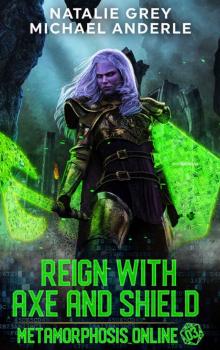 Reign With Axe And Shield: A Gamelit Fantasy RPG Novel (Metamorphosis Online Book 3)
Reign With Axe And Shield: A Gamelit Fantasy RPG Novel (Metamorphosis Online Book 3) Metamorphosis Online Complete Series Boxed Set; A Gamelit Fantasy RGP Novel: You Need A Bigger Sword, The New Queen Rises, Reign With Axe & Shield
Metamorphosis Online Complete Series Boxed Set; A Gamelit Fantasy RGP Novel: You Need A Bigger Sword, The New Queen Rises, Reign With Axe & Shield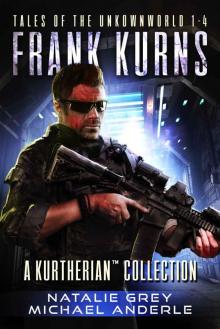 Frank Kurns Boxed Set
Frank Kurns Boxed Set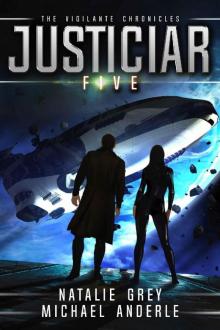 Justiciar (The Vigilante Chronicles Book 5)
Justiciar (The Vigilante Chronicles Book 5)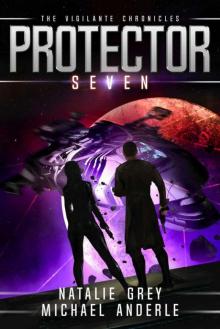 Protector (The Vigilante Chronicles Book 7)
Protector (The Vigilante Chronicles Book 7)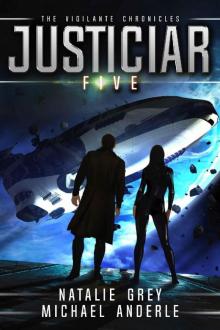 Justiciar
Justiciar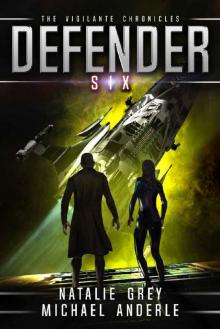 Defender (The Vigilante Chronicles Book 6)
Defender (The Vigilante Chronicles Book 6) The Vigilante Chronicles Omnibus
The Vigilante Chronicles Omnibus Dragon's Revenge (The Dragon Corps Book 4)
Dragon's Revenge (The Dragon Corps Book 4)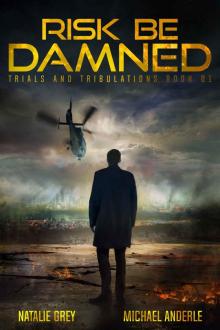 Risk Be Damned
Risk Be Damned Challenges
Challenges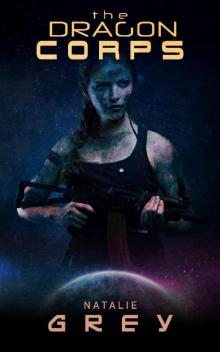 The Dragon Corps
The Dragon Corps The Vigilante Chronicles Boxed Set 1
The Vigilante Chronicles Boxed Set 1 BELLATRIX (Frank Kurns Stories of the UnknownWorld Book 3)
BELLATRIX (Frank Kurns Stories of the UnknownWorld Book 3) Warden
Warden Dragon's Hope (The Dragon Corps Book 3)
Dragon's Hope (The Dragon Corps Book 3)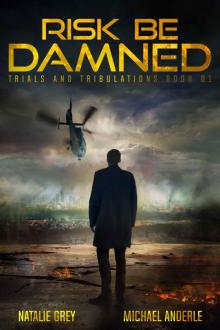 Risk Be Damned: A Kurtherian Gambit Series (Trials And Tribulations Book 1)
Risk Be Damned: A Kurtherian Gambit Series (Trials And Tribulations Book 1) Dragon's Promise (The Dragon Corps Book 5)
Dragon's Promise (The Dragon Corps Book 5)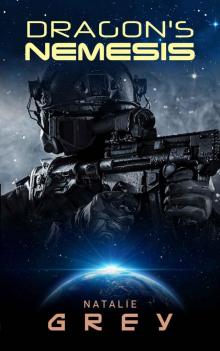 Dragon's Nemesis (The Dragon Corps Book 7)
Dragon's Nemesis (The Dragon Corps Book 7) To Hell And Back_A Kurtherian Gambit Series
To Hell And Back_A Kurtherian Gambit Series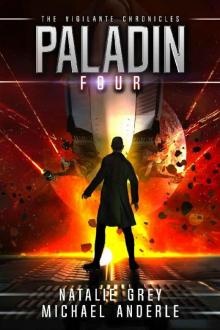 Paladin
Paladin Blood Sorcery (Shadows of Magic Book 2)
Blood Sorcery (Shadows of Magic Book 2) Bright Sorcery
Bright Sorcery Vigilante
Vigilante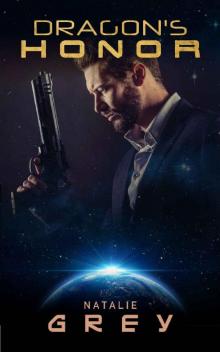 Dragon's Honor
Dragon's Honor Challenges (Frank Kurns Stories of the UnknownWorld Book 4)
Challenges (Frank Kurns Stories of the UnknownWorld Book 4)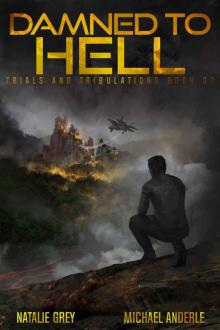 Damned Into Hell
Damned Into Hell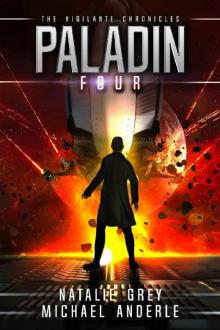 Paladin (The Vigilante Chronicles Book 4)
Paladin (The Vigilante Chronicles Book 4) BELLATRIX
BELLATRIX Dragon's Promise
Dragon's Promise To Hell And Back: A Kurtherian Gambit Series (Trials And Tribulations Book 3)
To Hell And Back: A Kurtherian Gambit Series (Trials And Tribulations Book 3)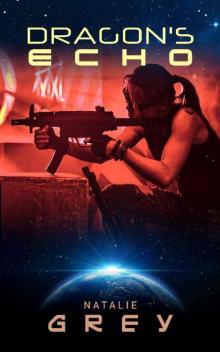 Dragon's Echo
Dragon's Echo Bound Sorcery: A Shadows of Magic Book
Bound Sorcery: A Shadows of Magic Book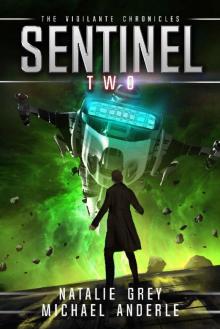 Sentinel
Sentinel Damned Into Hell: A Kurtherian Gambit Series (Trials And Tribulations Book 2)
Damned Into Hell: A Kurtherian Gambit Series (Trials And Tribulations Book 2) Dragon's Revenge
Dragon's Revenge